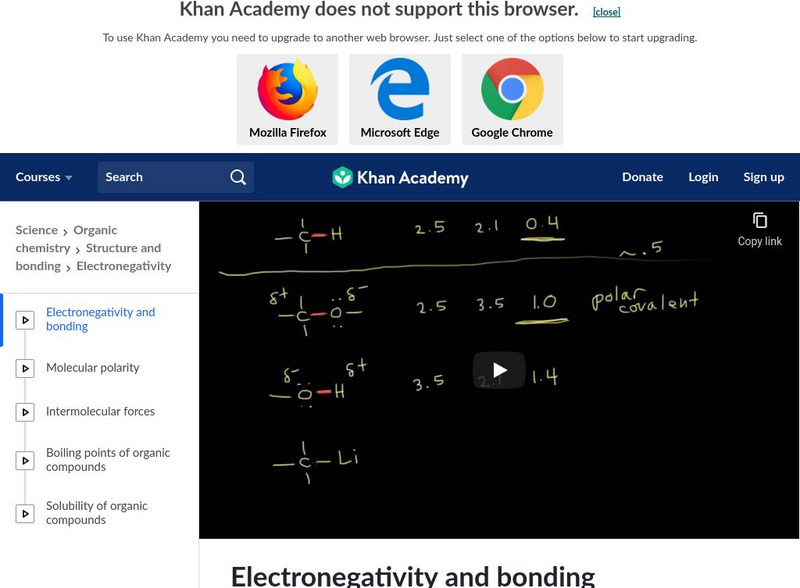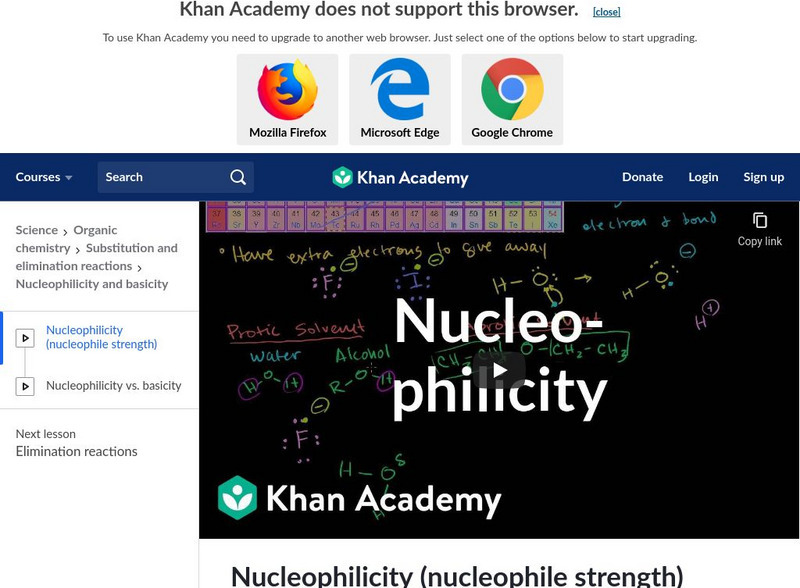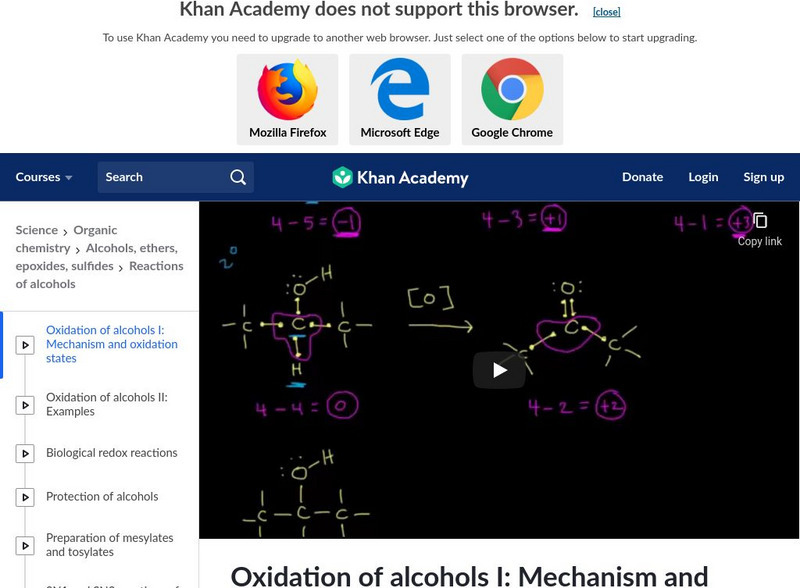Crash Course
Atomic Hook-Ups - Types of Chemical Bonds
Atoms form relationships with other atoms, just like humans. Their relationships are called bonds and there are different types. Explore how energy is transferred between atoms through ionic and covalent bonds.
Ricochet Science
Polar Bonds and Hydrogen Bonds
Hydrogen bonds aren't your run-of-the mill bonds — they make life possible! Use the video to understand how hydrogen bonds form between water molecules.
Ricochet Science
Electronegativity
It's not just any old bond! Through electronegativity, the instructor in a science video explains polar and nonpolar covalent bonds.
TED-Ed
How Do Geckos Defy Gravity?
Geckos are reptilian superheroes, defying gravity to climb walls and hang from ceilings, but where did they get these amazing superpowers? Watch this fun video as it examines the amazingly designed feet of these unique animals and...
Khan Academy
Sn1 Reactions
A video on Sn1 reactions diagram water and 2-Bromo-2-Methylpropane. Sal discusses the possible behaviors of the valence electrons. He reviews the concepts of nucleophilicity and electronegativity and the speed of each reaction stage.
Khan Academy
Addition of Water (Acid-Catalyzed) Mechanism, Organic Chemistry
Sal starts this lecture by presenting the question as it might appear in a test or chemistry problem set. After reviewing the naming of a molecule and then drawing it to clarify the electron arrangement, he explains how to determine the...
Khan Academy
Alcohol Properties, Alcohols, Ethers, Epoxides, Sulfides, Organic Chemistry
The properties of water, such as electronegativity, are related to its physical behavior. Water's boiling point, miscibility, and solubility are compared to those of other substances and related to van der Waals forces.
Khan Academy
Introduction to Reaction Mechanisms, Alkenes and Alkynes, Organic Chemistry
Starting with an example of how bromide might react with various alkenes, this lecture illustrates how valence electrons and electronegativity influence the likelihood of reactions.
Khan Academy
Khan Academy: Structure and Bonding: Electronegativity and Bonding
Learn how to classify bonds as covalent, polar covalent or ionic by using the differences in electronegativity in this video. Video explains the Pauling scale to find the electronegativity differences in bonding. [11:38]
Khan Academy
Khan Academy: Substitution and Elimination Reactions: Nucleophilicity
A video exploring the definition of nucleophilicity. Learn that nucleophilicity is the ability of an atom, ion, or molecule to lose their extra electron and bond. Also the video explains how to find the strength of the nucleophile. [13:54]
Khan Academy
Khan Academy: Preparation of Alcohols Using Na Bh4
Understand the general reaction of a carbonyl compound, sodium borohydride, to prepare alcohols with this video. Video gives you several examples to show how alcohols are produced and whether the reaction is oxidized or reduced. [12:35]
Khan Academy
Khan Academy: Oxidation of Alcohols I: Mechanism and Oxidation States
A video investigation of what it takes to oxidize alcohols. Video gives examples of how to calculate oxidation states by using electronegativity differences. Also learn what is formed as alcohols are oxidized. [12:37]
Khan Academy
Khan Academy: Electronegativity
Electronegativity is defined and compared to electron affinity. Trends based on groups and periods are also explored. [9:54]
Khan Academy
Khan Academy: Electronegativity and Bonding
Explanation of how differences in electronegativity effect chemical bonding. Bonds are classified by various bonding types.
Khan Academy
Khan Academy: Ionic, Covalent, and Metallic Bonds
An introduction to different types of chemical bonds.
Khan Academy
Khan Academy: Electronegativity
Learn the difference between electronegativity and electron affinity. Group and period trends are also discussed in relation to atomic radii. [9:54]
Khan Academy
Khan Academy: Electronegativity and Bonding
The Pauling Scale is used to understand bonding due to electronegativity. Bond types are classified. [11:39]
Khan Academy
Khan Academy: Biology: Chemistry of Life: Electronegativity
Get a definition and an explanation of electronegativity with this video. Explore the pattern that exist between electronegativity and the atoms position on the periodic table. [9:53]
Khan Academy
Khan Academy: Electronegativity: Electronegativity and Intermolecular Forces
Looks at how to discern whether molecules are polar or non-polar, and how to apply that polarity to intermolecular forces. [8:35]
Khan Academy
Khan Academy: Chemistry: Other Periodic Table Trends
A video lecture discussing the trends on the periodic table dealing with ionization energy, electronegativity, metallic nature, and atomic radius size. The video shows how electronegativity increases to the top right of the periodic...
Sophia Learning
Sophia: Electronegativity: Lesson 4
This lesson will define electronegativity and introduce the table of values. It is 4 of 4 in the series titled "Electronegativity."
Sophia Learning
Sophia: Polarity: Lesson 2
This lesson will define bond polarity as the unequal sharing of electrons. It is 2 of 2 in the series titled "Polarity."
Crash Course
Crash Course Chemistry #23: Polar & Non Polar Molecules
A crash course in molecular symmetry and electronegativity with information about about polar and nonpolar molecules.
Khan Academy
Khan Academy: Electronegativity
Explains electronegativity, an important concept in organic chemistry. [11:37]























